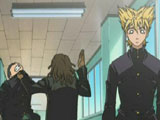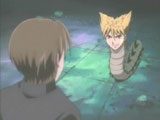

Quick Links:
Tenjho Tenge, Volume 1: The New Kids in Town
Nowadays, it feels like every other fighting series serialized in Shonen Jump or some other shonen manga anthology is getting made into an anime series. And from Flame of Recca to Hunter X Hunter to Naruto and Bleach, they all seem to stem from the same basic clichés. The characters start out as a bunch of kids, be they ninja, aspiring hunters or general punks, then training and becoming insanely powerful. While it follows a similar cliché from the very beginning, Tenjho Tenge differs in a lot of respects, most notably, that it is geared at a much older audience. While, for the most part, the previously alluded popular fighting anime series are all fairly light (despite being of such a violent nature), Tenjho Tenge is darker and more intense on the whole. When the fighting gets serious, out come the buckets of blood and broken bones. Director Toshifumi Kawase (Eat-Man '98) successfully brought an incredible intensity to each fight scene, so that they feel like matters of life and death. Creator "Oh! Great" (a former adult-manga artist) has made more of a mainstream name for himself with what amounts to a more adult-oriented variation of an extremely popular genre.
The story itself begins with a poetic narrative by the series' original protagonist-by-design, Masataka Takayanagi, introducing us to Todo High School: a school based around the revival and practice of martial arts. Quickly becoming the most sympathetic character in the series, we watch as Masataka's life gets a lot more frustrating and complicated when the protagonist, Souichiro Nagi and his partner-in-crime Bob Makihara show up at Todo with every intention of busting some grills, cracking some heads, and conquering Todo as their 100th victory. Todo however, lives up to its reputation, and Souichiro and Bob learn the hard way that conquering it won't be anywhere near as easy as they thought. Between the Executive Council set on kicking them out of school and the Natsume sisters of the Juken club either kicking their ass (In the case of the elder sister, Maya), or trying to marry Souichiro (In the case of the younger sister, Aya), Souichiro and Bob really have their hands full.
From its very beginning, Tenjho Tenge has an unusual energy to it, from the fact that you actually get fairly poetic narrative from Takayanagi, to the fact that most of the time, Maya Natsume looks like a little kid, though it works to great comic effect the first time she reveals her voluptuous true form. The series has a wonderful cast of characters, that is, vibrantly colorful and animated in both design and personality. Souichiro is likeable as the rash, egotistical high school punk stereotype, destined for incredible power, but incredibly awkward when it comes to Aya's advances. Aya, on the other hand, makes a wonderful foil to him, with her sunshiney exterior and fierce desire to be with and protect him. Maya struck me from the minute I saw her as a much bolder, sexier takeoff of Shaolin from Mamotte Shugogetten, but essentially her opposite in personality. Bob stands out in a lot of regards. You don't exactly see a black guy with dreadlocks in the main cast of most anime series, after all. And on top of that, he isn't even portrayed stereotypically at all. He's an amusing character to watch, as Souichiro's cooler, more collected counterpart, though he too has his breaking point. Some of his best moments in the first volume come in scenes with his girlfriend Chiaki, who struck me as a sexually-liberated tomboy. She and Bob compliment each other rather well. Then lastly, we get back to Takayanagi. As was mentioned before, I found him to be easily the most relatable and sympathetic guy in the series, and was originally designed to be the protagonist. He's the series' token down-to-earth nice guy, but like such characters in many anime series are, he's used to having the worst of luck in life. He's no one to discount in terms of fighting capability, though, considering his absolute victory in the epic throwdown he and Souichiro have in the second episode. For a fighting series, Tenjho Tenge has a rather extraordinary cast of characters, all of which are very likeable. Considering the aesthetics with which the characters are designed, both male and female viewers may enjoy the series, though it's clearly geared towards a more male audience.
Yasunori Honda has produced a rather excellent soundtrack for Tenjho Tenge. While not all the background music is memorable, all of it fits each and every scene perfectly, from an intense fight to an emotional flashback or moment of angst. The opening, "Bomb A Head! V" by m.c.A.T, is a very quirky and infectious hip-hop song that doesn't start out with much of a noticeable melody, but picks one up as the song progresses. Accompanied by some breakdancing, Tenjho Tenge's opening is one of the strangest I've seen or heard yet, and fits the series perfectly. The closing theme, "Aishitene Motto," by Aiko Kayou, accompanied by the stationary image of Aya, who we see and hear imploring us to love her more. The camera pulls back from her and an image from the manga comes together in the form of a puzzle, forming a nice contrast to the high energy opening, the latter of feeling like it's over before you realize it.
As seems to be the trend lately, Geneon's given us a fairly bare-bones release in terms of extras with the first volume of Tenjho Tenge. While they've provided two subtitle streams, the dialogue translation, and signs-only translation, in addition to the dual language options, there's only one real extra on the DVD. Said extra is just a non-credit opening, one of the usual suspects, aside from the trailers for forthcoming Geneon releases. But considering how addictive the opening is, I have to admit I found myself watching the non-credit opening a number of times anyway. There's just something about watching Maya transform.... At any rate, the disc presentation itself is quite well done, the packaging cover featuring a scantily clad Maya brandishing two katana in the foreground, and Aya gazing out at the viewer in the background. The back of the packaging features the usual well-arranged collage of screenshots, one from each of the four episodes, and a synopsis of volume. The menus on the disc itself are all very simple and easy to navigate, set to background music and artwork from the series, it all comes together very well.
Having heard a fair amount about Oh! Great's work and familiarizing with Tenjho Tenge's character designs before finally seeing any of the series, I had rather mixed expectations, though I was greatly anticipating the series nonetheless. In the end, I was thoroughly impressed, and am looking foward very much to seeing what becomes of our friends in the Juken club, considering that they have the Executive Council aiming for their heads. I can safely wager that there will be a tremendous amount of ass-kicking involved. Tenjho Tenge's off to one hell of a start that no fighting anime fan should miss.
(It is also of note that there is currently a great deal of controversy over the US release of the Tenjho Tenge manga. DC Comics' CMX manga branch made a decision to censor a great deal of the manga in order to apply a 13+ age recommendation, when the series is very unsuitable for children, considering the rampant sex and graphic violence that made it so popular in Japan to begin with. Fans have been organizing boycotts of CMX products in protest of this censorship, but DC simply replied that they were going to continue censoring the manga and not release an uncensored version. This reviewer is amongst the many who are absolutely disgusted with DC's decision, and encourages readers to join in on this boycott. In this day and age, anime and manga fans should not have to put up with this sort of treatment, and in and of doing what they have, DC has proven itself to be in the market "because it's popular with the kids," and not because they're interested in honestly bringing us good, professional translations of good manga series. Let us hope that they will learn to listen to fans, as Del Rey did with Negima.)
Distributor: Geneon Creator: Oh! Great / Shueisha/avex Released: 2004
Video Quality: A+ Audio Quality: A Presentation: B Content: B+ Overall: A



